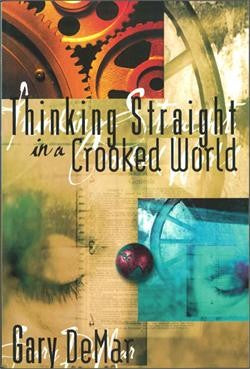Gary shows how to force unbelievers to live consistently with their stated anti-God beliefs.
All worldviews are by definition belief systems. A person does not have to believe in God to be considered religious. John H. Dietrich, for example, admits that he is a religious humanist.
For centuries the idea of God has been the very heart of religion; it has been said, “No God, no religion.” But humanism thinks of religion as something very different and far deeper than any belief in God. To it, religion is not the attempt to establish right relations with a supernatural being, but rather the unpreaching and aspiring impulse in a human life. It is the striving for its completest fulfillment, and anything which con- tributes to this fulfillment is religious, whether it be associated with the idea of God or not. [1]
Since we are all limited in knowledge and restrained by our inability to be everywhere (omnipresence) and know everything (omniscience), an atheist puts forth his claim that God does not exist in terms of a faith commitment. When the late Carl Sagan wrote, “The cosmos is all that is or ever was or ever will be,” [2] he was making a declaration of faith, a statement of his ultimate presupposition. There is no way he could be assured that God does not exist based on his limited knowledge and experience and the limited knowledge and experience of others. In the first line of the next paragraph of his best selling book Cosmos, Sagan admitted that “the size and age of the Cosmos are beyond ordinary human understanding.” [3] Even so, Sagan was convinced that the material world was all that existed. He believed one thing to be true and dismissed any worldview that did not conform to it without having all the facts or the ability to understand fully what he did know. Sagan’s assertions do not conform to reality. Greg Koukl writes:
Everybody believes something, and even what appears to be a rejection of all beliefs is a kind of belief. We all hold something to be true. Maybe what you hold true is that nothing else is true, but that is nonetheless something you believe.
Even if you are agnostic, [4] you believe that it is not possible to know things about ultimate issues like the existence of God. You believe in the justifiability of your agnosticism—your un- certainty—and you have a burden of proof to justify your un- willingness to decide. There is nowhere someone can stand where he or she has no beliefs.
If you reject Christianity, there is something else that you end up asserting by default. [5]
Once a person rejects Christianity, he has not set himself free from the concept of faith. He has only transferred his faith to something or someone else.

Thinking Straight in a Crooked World
The nursery rhyme ‘There Was a Crooked Man’ is an appropriate description of how sin affects us and our world. We live in a crooked world of ideas evaluated by crooked people. Left to our crooked nature, we can never fully understand what God has planned for us and His world. God has not left us without a corrective solution. He has given us a reliable reference point in the Bible so we can identify the crookedness and straighten it.
Buy NowGary shows how to force unbelievers to live consistently with their stated anti-God beliefs. This is the wedge of apologetics known as presuppositionalism. Using Proverbs 26:4-5 as his text, Gary shows that 1) evolution is a religion, and 2) it cannot produce a morality short of “only the strong survive.”
Click here for today’s episode
Click here to browse all episodes of The Gary DeMar Podcast
[1] Quoted in Cornelius Loew, Modern Rivals to Christian Faith (Philadelphia, PA: Westminster Press, 1956), 11.
[2] Carl Sagan, Cosmos (New York: Random House, 1980), 4.
[3] Sagan, Cosmos, 4.
[4] The word agnostic was coined by Thomas Henry Huxley (1825–1895). The word is comprised of the prefix a which means “without” or “having none” and the Greek word for “knowledge,” gnosis. An agnostic is someone who is without knowledge on a subject. A religious agnostic claims that he does not have enough knowledge to determine whether God exists. The Bible claims otherwise: “That which is known about God is evident within them; for God made it evident to them. For since the creation of the world His invisible attributes, His eternal power and divine nature, have been clearly seen, being understood through what has been made, so that they are without excuse” (Rom. 1:19–20).
[5] Greg Koukl, “You’ve Got to Believe Something,” The Plain Truth (January/February 1999), 39.

